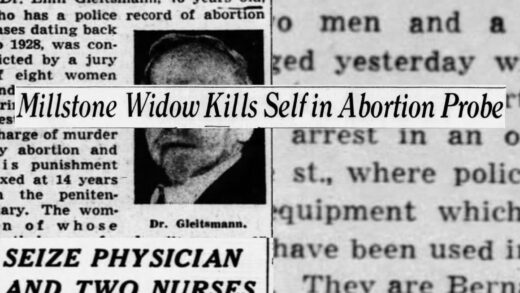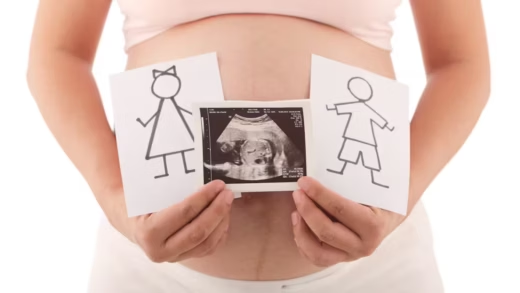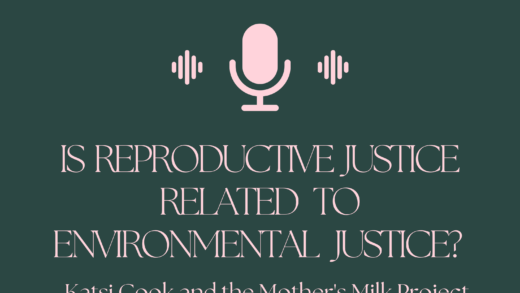by: Annelise Mesa

This podcast investigates the American prison system’s treatment of pregnancy and what the repeal of Dobbs v. Jackson means for incarcerated people. We will explore the experiences of incarcerated pregnant people and how the criminal justice system disregards people’s rights to bodily autonomy and reproductive freedoms.


Transcript
- Opening Music for 8 seconds then fade
- Hello, thank you for listening to “Restrained: Pregnancy Behind Bars”
- This podcast will investigate pregnancy within the carceral system and how the repeal of Dobbs will impact the most marginalized. My name’s Annelise Mesa.
- Music fades up for 6 seconds – then fades out completely
- In the US, it’s estimated that there’s 58,000 incarcerated pregnant people per year. That makes up about 4% of incarcerated women.
- Additionally, 4% of women enter prison while pregnant, and most of them, 58%, enter without health insurance.
- These people’s pregnancy and birthing experiences are unseen and untold. Their stories are hidden and locked away—just as they are.
- As understood in the larger scheme of the prison industrial complex, it’s no surprise that prison and jails’ handling of pregnancy violates the principles of reproductive justice.
- Defined by SisterSong, reproductive justice is the (quote), “human right to maintain personal bodily autonomy, have children, not have children, and parent the children we have in safe and sustainable communities.”
- Incarceration strips people of their bodily autonomy, leaving it in the hands of unsympathetic and abusive wardens, corrections officers, and understaffed medical agencies.
- The decision to have or not have children is often completely taken away from incarcerated people. And it’s often the case that they are unaware of their right to abortion if available in their state.
- Let’s listen to expert OB-GYN, Carolyn Sufrin from the podcast “Public Health on Call”, “It depended—not only on what state you were in, but what facility you were in. One jail might have a policy that allowed abortion, and another jail down the road might not. … even in states where abortion was legal and fully accessible up to [fetal] viability, some prisons and jails had either official or unofficial policies that did not allow incarcerated women to access abortion.”
- Inconsistency is a general theme across the board in the carceral system.
- Differences in regulations across counties and states, local jails and federal prisons, and state-funded versus private for-profit prisons, further complicate accessing information on what goes on in prisons and how to address issues.
- The literal and metaphorical barriers to accessing these stories are apparent. Inconsistency is even prevalent in data collection within prisons and jails.
- Simple questions such as “How long are people in jail? For what crimes? Are most people awaiting trial?”—even “How many people are in jail?” Is impossible to ascertain with complete accuracy.
- It’s clear that the carceral system is not just failing pregnant people, but it’s failing everybody.
- Yet, The United States funnels over $80 billion dollars into the prison industrial complex a year. But where is it all going?
- Certainly not to improve the quality of life of incarcerated people, or provide them adequate healthcare, food, hygiene products.
- Incarcerated people not being given underwear and menstrual products is a regular issue, for example.
- And when it comes to those who are pregnant, they are usually denied extra food, prenatal care, doctor’s visits, and—notably—denied consistent expectations for their birthing experience.
- Factors such as will you be taken to the hospital, who will be in the birthing room—if any family or loved ones are even allowed—and how long you will get to see, or hold, your newborn child are inconsistent.
- Research done for the Social Science & Medicine journal titled “Lived experiences of pregnancy and prison through a reproductive justice lens” cites an experience of someone (quote) “giving birth in their cell after prison clinical staff disregarded her repeated appeals that she needed attention from a midwife.” (end quote).
- Another person was purposefully kept in the dark about her due date, claiming, (quote) “Since I had a C-section, they had already planned when I was going to go in. They don’t tell you when, just so you can’t tell people on the outside…. It’s like a big surprise.” (end quote)
- Imagine medical professionals purposely ignoring your pleas and questioning, leaving the safety of yourself and your child in their hands—whether you like it or not.
- Inconsistency is especially prevalent when it comes to shackling, or “restraints” as the law often politely puts it.
- 40 states have restrictions on the shackling of pregnant people, but laws vary for when and where shackles are used.
- Rules for shackling during transportation, during pregnancy, during labor and delivery, during postpartum, and where shackles can be used: waist, wrists, or ankles—are not standardized.
- And, corrections officers and wardens regularly do not follow the rules in place, and go unchecked.
- The AMA Journal of Ethics argues that, “Shackling a woman by the ankles, wrists, and/or waist during pregnancy and delivery is not only unnecessary for security reasons, it is also medically hazardous and emotionally traumatizing. While shackled, pregnant women are at an increased risk of falling and sustaining injury to themselves and their fetuses. During labor and delivery, shackling interferes with a woman’s ability to assume various positions and prevents her immediate transport to the operating room if necessary.” (end quote)
- Shackling is emotionally and physically dangerous, plus incarcerated people are more at risk for miscarriages and complications in birth due to pre-incarceration marginalized medical care.
- Looking through the Smith College Special Collections, I sorted through correspondence and writing from incarcerated people to the Prison Birth Project.
- The Prison Birth Project, or PBP, worked to improve the conditions for pregnant and parenting people who were incarcerated, often through doula work with incarcerated people.
- In an email to a leader of the PBP, one woman thanked them for their aid and also argued, “Restraining a person in labor is not only unsafe but it is so dehumanizing. … I felt so scared and afraid of not being in control of my own body. I was laboring on the demands of the Department of Corrections.”
- Let’s listen to a recounting by Jessica Kent of her experience giving birth while incarcerated.
- “I tell the nurse that I’m in labor. She puts me in a wheelchair with a puppy pad underneath me and I am left there for over four hours. See, the night shift didn’t want to take me to the hospital. They wanted to wait until day shift to take me. Luckily, I was transported to Little Rock, Arkansas, where I delivered my child at 3 p.m. I wish I had the time to describe the horror of giving birth with corrections officers on your side. I wish I could tell you the unbelievable pain I felt holding my newborn baby with leg chains around me. I wish I had the time to explain to you all of the trauma and psychological damage that had done to me.”
- As we approach Donald Trump’s second term and the threat of Project 2025’s implementation, I want to consider the effects of the repeal of Dobbs v. Jackson.
- Incarcerated pregnant people’s access to abortions was already limited, but the issue is now exacerbated.
- Let’s listen again to Carolyn Sufrin’s opinion. “That chilling effect is going to be even worse for incarcerated individuals because they don’t have any control over their health care, and the prison or jail doesn’t have control over what happens in the hospital. So even if they want the best of care for the people in their custody, if they’re taken to a hospital that won’t do a DNC for someone who’s having a miscarriage, the prison or jail has no recourse or ability to provide that care.”… “Incarcerated pregnant people who are forced to carry unwanted pregnancies and then suffer the consequences of that—they are being punished with pregnancy. And even pre-Dobbs, with what I described as the lack of consistent access to abortion, there were already women who were living in this post-Roe reality and being punished with pregnancies.”
- Once again, incarcerated individuals face the brunt of the issue. If anything, people in states facing abortion restrictions are experiencing what incarcerated individuals do, as Sufrin claims, “now we’re seeing that punitive and criminalized aspect to pregnancy pan out for everybody in society.”
- The presidency we’re swiftly approaching is horrifying for people with uteruses, for queer people, for people of color, for incarcerated people, for all marginalized people.
- But I want to leave you with a bit of strength and inspiration by revisiting the Prison Birth Project.
- In answering what she wants the outside world to know about her, one incarcerated woman wrote, “I am a mother. I can do anything. I can achieve my life with my family and my children. I’m funny. I still have rights and I will be free to say “yes, I can do anything.”
- Another wrote “I can make a difference in the world, I have a voice, I will be heard either way, I am a woman, a mother, a daughter, a friend, I walk with pride every day. … I breathe in good karma and breathe out the bad. We as women have rights, have a choice, we just need to open our eyes and see the support.”
- [Outro music begins under]
- I aspire to carry their resilience, strength, and pride with me each and every day, and I hope you can take some of that with you too.
- The fight for reproductive justice must continue through our collective power. We can not fail the people who the system already does.
- This has been “Restrained: Pregnancy Behind Bars.” Thank you for listening.
- Outro music fades up – plays for 5 seconds, then fades out over 5 seconds.
References
Aleks Kajstura, Wendy Sawyer. W. Women’s Mass Incarceration: The Whole Pie 2024. Prison Policy Initiative. https://www.prisonpolicy.org/reports/pie2024women.html
Bach, A. (2018, March 22). “Missing: Criminal Justice Data.” The New York Times. https://www.nytimes.com/2018/03/21/opinion/missing-criminal-justice-data.html
Cavanagh, A., Shamsheri, T., Shen, K., Gaber, J., Liauw, J., Vanstone, M., & Kouyoumdjian, F. (2022). “Lived experiences of pregnancy and prison through a reproductive justice lens: A qualitative meta-synthesis.” Social Science & Medicine, 307, 115179. https://doi.org/10.1007/s10995-022-03526-y.
Clarke, J. G., & Simon, R. E. (2013). Shackling and Separation: Motherhood in Prison. The AMA Journal of Ethics, 15(9), 779–785. https://doi.org/10.1001/virtualmentor.2013.15.9.pfor2-1309
Joshua Sharfstein, “Jailed and Pregnant: What the Roe Repeal Means for Incarcerated People.” Johns Hopkins Bloomberg School of Public Health, September 22, 2022. https://publichealth.jhu.edu/2022/abortion-care-for-incarcerated-people-after-dobbs.
Kramer, C., Thomas, K., Patil, A., Hayes, C.M., and Sufrin, C.B., “Shackling and Pregnancy Care Policies in
US Prisons and Jails.” Maternal and Child Health Journal 27, no. 1 (November 13, 2022): 186–96.
Mothers Among Us session writings and essay, 2003-2010. Prison Birth Project, Sophia Smith Collection,
SSC-MS-00728, Smith College Special Collections, Northampton, Massachusetts.
https://findingaids.smith.edu/repositories/2/archival_objects/167793 Accessed 20 November 2024.
Peter Wagner, Bernadette Rabuy. “Following the Money of Mass Incarceration.” Prison Policy Initiative, January 25, 2017. Accessed November 23, 2024. https://www.prisonpolicy.org/reports/money.html.
Reproductive Justice — Sister Song. (n.d.). Sister Song. https://www.sistersong.net/reproductive-justice
TEDx Talks. “What It Is Like to Have a Baby in Prison | Jessica Kent | TEDxIndianaUniversity,” July 20, 2021. https://www.youtube.com/watch?v=ucKFx427H5w.


